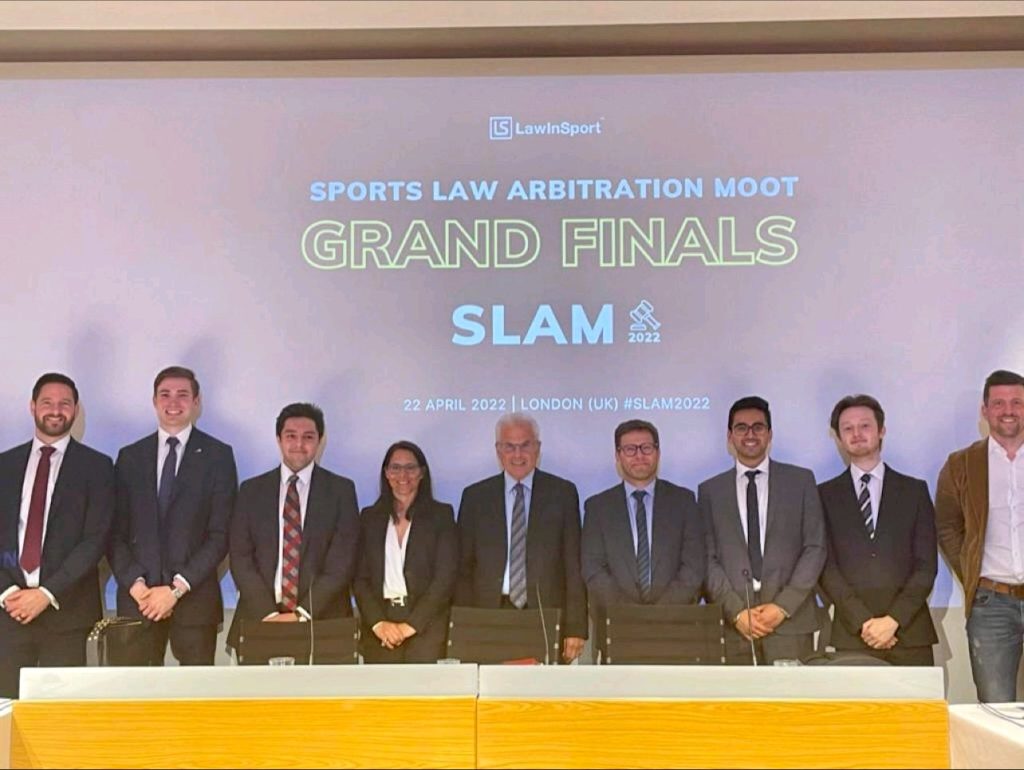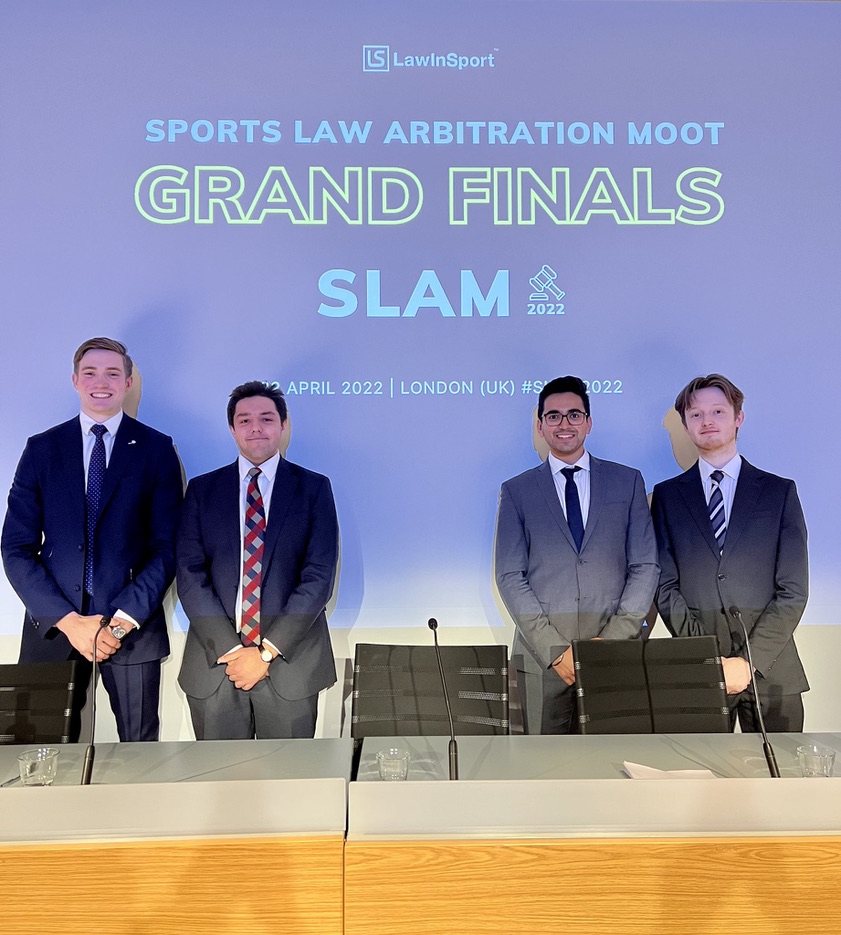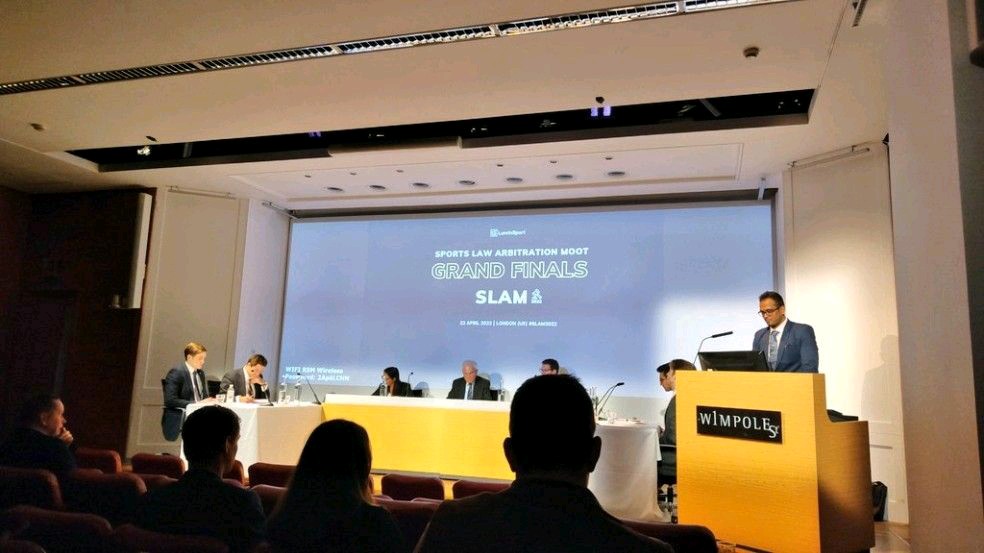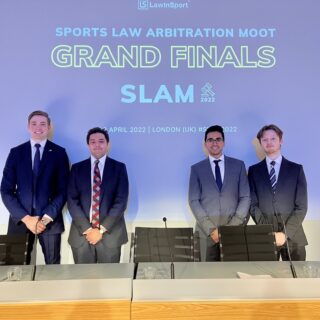Earlier this year, Will Baylis-Allen and Kieran Bailey won the Sports Law Arbitration Moot (SLAM), the largest international sports law mooting competition. Here they both fill us in on what was involved…
What is SLAM?
The Sports Law Arbitration Moot is a mooting competition run by LawInSport featuring 70 university teams from around the world arguing over sports law issues. City Law School team, comprising of Kieran Bailey and Will Baylis-Allen from the GDL course, took home 1st place this year before a judging panel featuring the Rt Hon. Lord Dyson.
What were the moot problems?
There were 2 moot problems throughout the competition. The moot problem for the preliminary written round and quarter-final round was the same. A new problem was then given for the semi-final and Grand Final. The initial moot problem was an anti-doping dispute between a young golfer and the International Golf Federation, involving the use of a prohibited substance beta-blocker called Propranolol. The second moot problem was based on the real-life dispute between UEFA and the Russian Football Federation, focussing on the dispute over Russia’s suspension from UEFA competitions.

Competition Structure including stages and timeline
The moot consisted of a preliminary written submission round, followed by the speaking rounds. Before the written round there was a training session on written submissions from Court for Arbitration of Sport (CAS) arbitrators, sports lawyers, and lecturers. Prior to the speaking rounds, there was an oral advocacy session run by the same team, which everyone could attend regardless of whether their written submission qualified for the quarter-finals.
8 teams out of 70 were selected from the preliminary written submission round to go through to the quarter-finals which mark the start of the speaking/ oral rounds. *
*In 2022/23 it looks likely that there will be regional finals before the Grand Finals.
Written Round
The written round was comprised of 2 separate 5000-word submissions, a submission for each side/party of the moot problem, with both combining for a total of 10,000 words. This is a substantial commitment when one is already doing a law degree, but the timeline affords you plenty of time (see below section). As one might imagine, 10,000 words sounds daunting on the face of it. However, we found that we had to cut a lot of words from our submissions to be under the limit as there was a lot of content to get through. The written submissions are then marked by 2 markers, from a pool of markers from the sports law world including top QC barristers, sports lawyers, solicitors, and CAS arbitrators.
Oral Rounds
The quarter-final rounds onwards were adjudicated by 3-person panels, the makeup of which consisted only of CAS arbitrators. The quarter-finals were held via zoom, the semi-finals and Grand Final were held in-person at a venue in London on the 22nd of April. For each round we were given 30 minutes speaking time in total, which included time for rebuttal.

Final stages and winning the Grand Final
In the semi-final we were counsel for the appellant, which we had prepared very well given we had 3 weeks between the rounds. However, the moot organisers purposely switched what side each team was representing in the final, so we were counsel for the respondent which was a challenge to say the least! The Grand Final had a large audience of people from the sports world which was rather daunting. The panel of judges in the final comprised of Lord Dyson, Former Justice of the Supreme Court & Master of the Rolls, Raphaëlle Favre Schnyder
Partner, Barandun AG & Alternate Judge at Appellate Court of Valais, and Mark Hovell, Partner and Mills & Reeve LLP. The judges were persistent with their questions, but the style is less formal than a traditional moot. The original vote was split 2:1 which shows how tight the final was, but the top advocacy of Kieran was the difference-maker.
How we heard about SLAM and why you should participate
Finding out about SLAM was partially by accident! I came across LawInSport’s website whilst looking for ways to illustrate an interest in sports law and also the entry routes into the sports law sector more generally. It is hard to demonstrate tangible evidence of an interest in sports law, as sports law tends not to be a module on the majority of law courses aside from sports law LLM courses. As such, the SLAM moot offered a way to familiarise ourselves with sports law topics in a dynamic way, a method which does not involve just reading a textbook.

Dealing with a new area of law/ resources to explore
We would both say that it was unfamiliar at first. Sports law in the context of both moot problems involved reading a lot of CAS cases and sports body regulations. It was emphasised that competitors should stick to the usual ‘apply the law to the facts’ approach. We looked at a wide range of CAS cases involving Manchester City, Maria Sharapova, the recent Winter Olympics Russian figure-skating case, and the UEFA v Russian Football Union case. We found reading cases like these to be incredibly intriguing, especially given their current day prevalence. The hardest element of dealing with a new area of law was how to structure our written submissions, it certainly differs from say a traditional humanities essay. We based our structure on the CAS Awards cases which worked well.
Application/ Registration/ Timeline
The application was not assessed or selective. There was a £50 sign-up fee, so £25 per person given you are in a team of 2 people. This year the fee has doubled however.
Timeline
The registration deadline was in December, the written submission deadline was in mid-February. The semi-final and Grand Final were on the 22nd of April.

